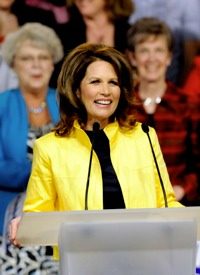
While Romney’s affinity for such establishment icons is predictable, Bachmann’s hiring of Patton Boggs, LLP is a bit of a country club choice, out of character for the darling of the Tea Party.
Patton Boggs focuses its practice on issues of governance and international trade. The redefining of the core constitutional principle of separation of powers is immaterial to the firm that boasts:
Patton Boggs began as an international law firm concentrating in global business and trade in 1962. While we have maintained our strong concentration in international and trade law, we have evolved beyond our roots to become a full-service firm with a national presence in every major area of legal representation. We were among the first law firms to recognize that all three branches of government could serve as forums in which to achieve client goals, enabling us to emerge as the nation’s leading public policy law firm, and we have developed our extensive business law capabilities into the firm’s largest practice area.
Despite its nearly unparalleled campaign curriculum vitae, Patton Boggs isn’t the only outfit with contenders as clients.
As disparate as Mitt Romney and Michele Bachmann may appear on paper and by reputation, Jon Huntsman and Ron Paul are two of the GOP’s truly antipodean alternatives, and both are clients of Arent Fox, another law firm with top-shelf resources and a bipartisan clientele.
Upon learning of the fees charged by these campaign counselors, it’s little wonder they aren’t out chasing ambulances. According to a report in Politico, candidates typically pay $50,000 monthly in legal fees to these firms.
The exorbitant amounts paid by campaigns to these lawyers likely is justified by campaign treasurers in light of recent Supreme Court decisions that have obliterated the barriers between political action committees and other interest groups and the exercise of their right to influence elections. These high court holdings married with regulatory revisions have created a miasma of confusing and complex rules with which all candidates and PACs must comply if they wish to avoid running afoul of any agency with oversight of campaign financing, specifically on the managing of elections in general.
Despite the pretexts proffered by the coterie of candidates for the retaining of such big-dollar law firms, the question remains how the central cadre of anti-establishment supporters of Michele Bachmann, for example, will respond to their candidate’s decision to contract with dyed-in-the-wool country club attorneys. The Politico piece reports that the action “turned some heads.”
In terms of how the Patton Boggs affiliation will affect her potential run for the White House, it depends on how much attention is paid by the masses to such an issue of campaign governance. Undoubtedly, the Bachmann team hopes that talk of regulatory schemes and Federal Election Commission compliance is a bit “inside baseball” for most voters and will ultimately be ignored when the time comes to pull the curtain and pull a lever.
While padding the pockets of establishment attorneys may not add to Bachmann’s “rebel” bona fides, it is not all that head-shaking a move. It is de rigeur for mavericks to ride thoroughbreds down the stretch and might even be seen as a solid race strategy.
One candidate’s choice of counsel is curious, however. Former Utah Governor Jon Huntsman, the favorite of the establishment cornerstone Council on Foreign Relations, has hired Craig Engle of Arent Fox to handle his legal matters.
According to Engle’s résumé as presented by Politico, the Arent Fox associate is a “moderate Republican” and former general counsel to the National Republican Senatorial Committee. Engle was also recognized by the homosexual group Log Cabin Republicans for helping “champion the fight for creating a more inclusive Republican party.”
The employment of a lawyer with such a fondness for “diversity” may hint at Huntsman’s own “big tent” philosophy and eagerness to engage and recruit voters from the widest possible spectrum of Republicans.
Friend of the Constitution and Texas Congressman Ron Paul (R-Texas) has also picked an Arent Fox man to be his legal point of contact. Brett Kappel represents the Ron Paul 2012 campaign, but has performed the same role for various Democratic candidates. It is certainly not out of character for the Libertarian-leaning Paul to go with a representative with a broader approach to politics and a more accommodating political philosophy.
Every candidate for President (or any national elective office, for that matter) would be wise to protect himself from the pitfalls pocking the road to 1600 Pennsylvania Avenue. Any violation of applicable finance, election, or campaign laws or regulations could irredeemably hamstring a campaign, whereas careful compliance could propel it to overflowing coffers and an active communication with their corps of likely supporters through advertising and advantageous alliances with the roster of external advocacy groups anxious to spend money and garner influence.
The lawyers also know something of the value of a highly placed client list. Politico printed the following quote from former FEC chairman Michael Toner:
Representing a presidential campaign that wins the primary — and certainly one that wins the general election — is a unique opportunity for any law firm to enhance its standing in the election law field. It’s often hard to predict the impact, but it can generate a lot of derivative work.
As the primary election season approaches, the work of safely shepherding candidates through the minefield of regulation will begin in earnest, and the crush of compliance will test the mettle of these campaign counselors.
Photo of Michele Bachman: AP Images



